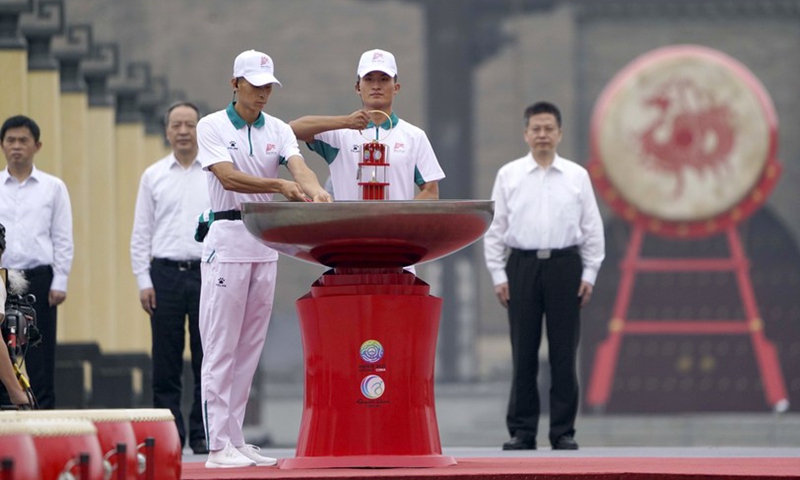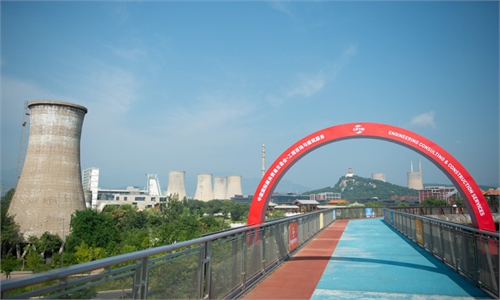Strict epidemic prevention measures at National Games 'a rehearsal for Winter Olympics,' observers say

A staff member (4th L) holds the flame lantern before lighting the cauldron prior to the torch relay for China's 14th National Games, 11th National Paralympic Games, and eighth National Special Olympics in Xi'an, Shaanxi Province, Aug. 16, 2021. Photo: Xinhua
Many athletes and media personnel have already arrived in Xi'an and are preparing for the upcoming National Games, the country's top sports event, amid strict epidemic prevention and control measures. Observers said it could be an early rehearsal for the upcoming Winter Olympics in Beijing.
As of Thursday, some of the events have already started, and the epidemic prevention measures are relatively strict. More than 13,000 athletes, coaches, referees and media staff from across the country are under closed-off management in the National Games Village.
To reduce the risk of spreading the epidemic, flights to Xi'an are now requiring passengers to provide the result of a negative nucleic acid test within 48 hours, and more than 4,000 attractions in Xi'an have been suspended.
The Xi'an National Games aims to be “epidemic-free.” The measures include supervising the completion of vaccination of all race-related and event-related personnel, and health monitoring and nucleic acid testing of all race-related personnel 14 days before their arrival. At the same time, the airport, high-speed railway stations and train stations have opened a "special channel for the games," with a special car for point-to-point pick-up.
Spectators will be present at the National Games, according to the organizing committee. All spectators need to complete the full COVID-19 vaccination 14 days before the games, and provide proof of a negative nucleic acid test within 72 hours beforehand.
On Wednesday, Thomas Bach, president of the International Olympic Committee (IOC), said at an executive board meeting that the IOC and Beijing 2022 will apply the same principles as for Tokyo 2020, to ensure safe Olympic and Paralympic Winter Games.
Experts said Beijing will learn from Tokyo's experience, but will be more strict with its anti-epidemic measures. The situation is likely to be better, they said, as the current epidemic status in Beijing is far less severe than in Tokyo, and China has had solid results in epidemic prevention.
"Tokyo implemented precise and scientific prevention and control, rather than complete, rigid prevention and control," said Da Zhigang, director and research fellow of the Institute of Northeast Asian Studies at Heilongjiang Provincial Academy of Social Sciences. The aim in Tokyo, Da said, was to "keep the atmosphere, public opinion and quality of the Olympics intact, while controlling the outbreak as much as possible."
Wang Guangfa, a respiratory expert at Peking University First Hospital, told the Global Times that it's necessary for all participants in the Beijing Winter Olympics to be fully vaccinated, and China could arrange this for those who cannot get access to vaccines in their own countries, as winter is when SARS-CoV-2 usually survives longer.
An expert at the Chinese Center for Disease Control and Prevention who requested anonymity told the Global Times that unlike the Tokyo Olympics, which had many indoor events, most events at the Beijing Winter Olympics will be held outdoors, making it possible for spectators to watch the events in person, the way they watch the National Games in Xi’an.
The Beijing 2022 Playbook, outlining guidelines for all stakeholders and unveiling the games’ specific COVID-19 prevention and control measures, is expected to be finalized and published in October. This will build on the experience from the Tokyo 2020 Games and benefit from the continued input from worldwide experts and the World Health Organization, according to the IOC.
The Beijing 2022 Winter Olympic Games will take place between February 4 and 20 next year.



